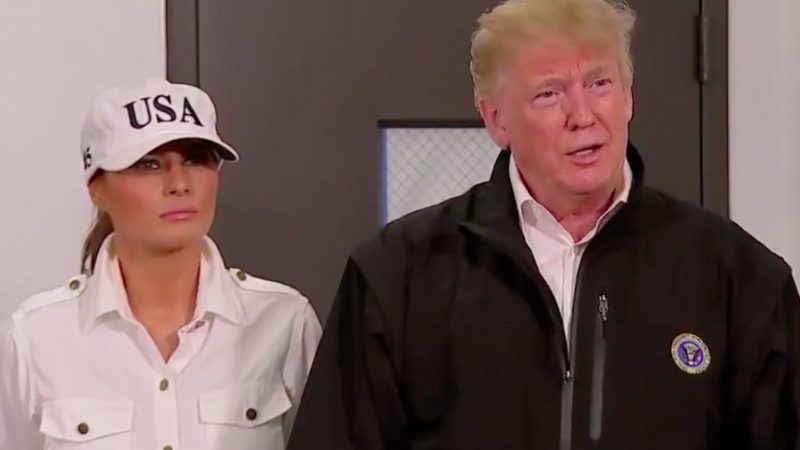Trump Seems More Skeptical of Elizabeth Warren's Ancestry Test Than of Saudi Innocence in Death of Jamal Khashoggi: Reason Roundup
Plus: HHS proposes new drug-ad disclosures.

"There's not enough money in the world for us to buy back our credibility on human rights," chastises Rubio. Authorities have admitted that maybe U.S.-based Saudi journalist Jamal Khashoggi was killed while paying a visit to the Saudi consulate in Istanbul, and have promised to put out a statement soon with more information about the death of a man routinely critical of his country's leadership and policies. To President Trump, this seems neither a cause for alarm nor a rethinking of America's close ties to Saudi leaders.
In interviews Monday, the president not only struck a nonchalant tone about the situation but helped prop up a preemptive defense, suggesting (despite all evidence pointing to the contrary) that Khashoggi's death had naught to do with Prince Mohammed bin Salman and other official leaders and had happened at the hands of "rogue" Saudi cops.
The response has drawn criticism even from generally Trump-friendly corners. Sen. Marco Rubio (R-Fla.) has said that if Trump won't do something about about the situation, Congress will. "There's not enough money in the world for us to buy back our credibility on human rights," Rubio told CBS.
What's so galling and chilling about the Trump WH and Saudi response to the Khashoggi murder is that it's all the normal Trump toolkit of lying and gaslighting and hand waving in an attempt to get away with literal murder.
— Chris Hayes (@chrislhayes) October 15, 2018
Trump seemed more at ease yesterday discussing Democratic Sen. Elizabeth Warren's family history. The president has prolifically mocked Warren for laying claim to Native American ancestry, and even offered to pay $1 million to a charity of her choosing if she would take a DNA test to prove her heritage. She did, and the results suggest that she does have some Native American ancestry.
Asked whether he would make good on the charity donation promise, Trump initialy dismissed the idea that he had ever promised any such thing, despite there being ample video of him making such a claim as recently as July.
Trump on offering $1 million for Elizabeth Warren's DNA test: "I didn't say that." This is him saying that: pic.twitter.com/G2vRiQU0PA
— Tommy Christopher (@tommyxtopher) October 15, 2018
Later in the day, Trump changed his tune, insisting that he would indeed hold up his end of the deal—but only if he could swab Warren's cheeks himself. "I'll only do it if I can test her personally," Trump told ABC News. He added that "it will not be something I enjoy doing" (because everyone knows that instituting creepy conditions like this is less creepy if you're also defensive about possibly enjoying it!).
On Twitter Tuesday morning, Trump continued to lay into Warren, whom he likes to call "Pocahontas (the bad version)" lest there's any confusion that he's talking about the long-dead Native American woman that inspired a Disney movie.
Pocahontas (the bad version), sometimes referred to as Elizabeth Warren, is getting slammed. She took a bogus DNA test and it showed that she may be 1/1024, far less than the average American. Now Cherokee Nation denies her, "DNA test is useless." Even they don't want her. Phony!
— Donald J. Trump (@realDonaldTrump) October 16, 2018
Warren didn't do herself any favors with this stunt either, however. For instance, a statement from the Cherokee Nation said her claims dishonor "legitimate tribal governments and their citizens, whose ancestors are well documented and whose heritage is proven," and accused Warren of "undermining tribal interests."
FREE MARKETS
TV drug ads about to get even worse? Television commercials for pharmaceuticals are already a comical mix of smiling, healthy people oblivious to the steady drone of voiceover narration about possible side effects and complications. Now, the required mumbo-jumbo in this ads may get even longer. On Monday, federal regulators announced a proposal to mandate that drug companies disclose during television ads whether the featured medication could cost more than $35 per month.
"Patients deserve to know … if the drug company has pushed their prices to abusive levels," said Health and Human Services (HHS) Secretary Alex Azar. "And they deserve to know this every time they see a drug advertised to them on TV."
Nevermind that no other category of products are required to list prices at the point of advertisement, nor that there are myriad other ways consumers can find the cost of a medication and nobody pays much attention to the verbal "fine print" in these ads anyway—the Trump HHS is proving itself just as willing as Democratic predecessors to dabble in health care and pharmaceutical regulation that had only a symbolic effect for consumers while racheting up bureacratic hoops for businesses.
QUICK HITS
- Midterm ad hall of shame:
Man this anti-Democrat ad that keeps playing on CNN is really something pic.twitter.com/GDrrQ0QDpi
— Elizabeth Nolan Brown (@ENBrown) October 16, 2018
- Who could have predicted this?
SF police say the closure of #Backpage has pushed sex trafficking, pimping back out onto the streets. Reported crimes have tripled over the previous year. By @ted_d_andersen https://t.co/e2ixBjS8kR
— Megan Cassidy (@meganrcassidy) October 15, 2018
- A judge has tossed Stormy Daniels' defamation lawsuit against President Trump.
- The U.S. Embassy in Australia apologizes for accidently inviting people to a cat-pajama party when no such event is scheduled.
- Former Trump adviser Carter Page is suing the Democratic National Committee over allegations that he had secret ties to Russia.
ICYMI: My investigation of Little Rock's drug enforcement unit, published yesterday. They're serving almost all drug warrants with illegal no-knock raids, some with explosives. There's also evidence that cops and informants have lied in affidavits. https://t.co/VzeCRx7wN8
— Radley Balko (@radleybalko) October 15, 2018



Show Comments (296)